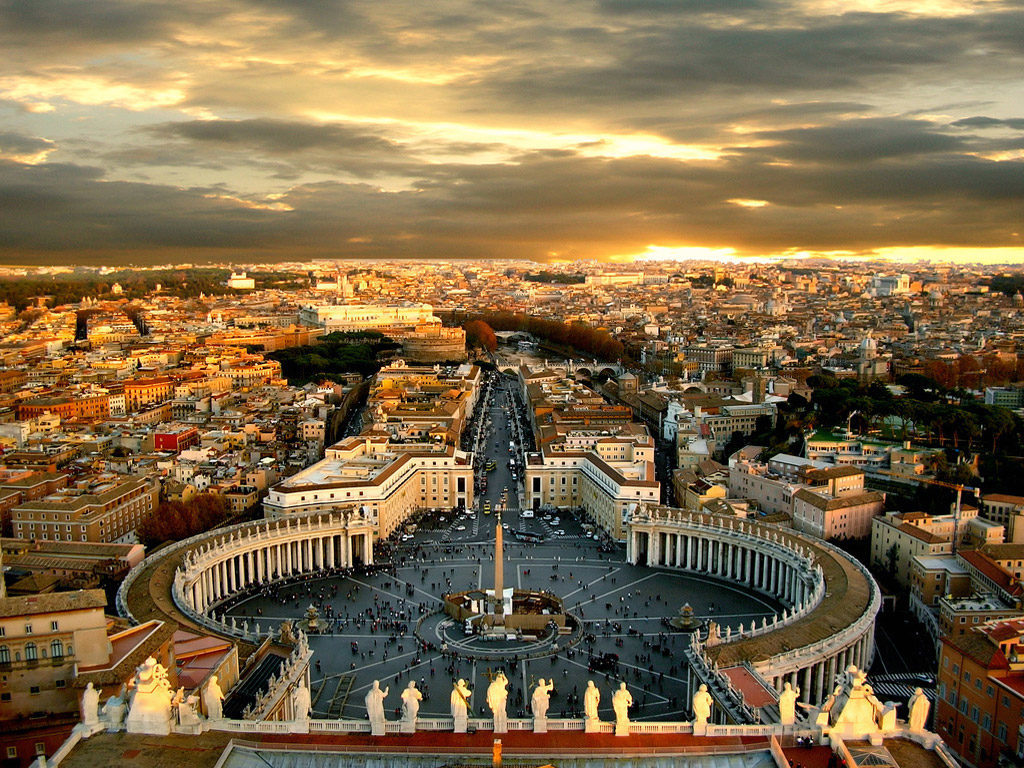Here’s a guide with all the useful information and more:
It is hard to believe that the so called ‘Capital of the World’ was born, according to tradition, by a settlement of farmers on the Palatine Hill and with the aid of a wolf that nursed two twins (the future founders of Rome). Perhaps this is the mystery that encourages millions of tourists per year to explore this magical city.
Moreover, Rome attracts a large number of art and history lovers.
Today people come and return to Rome in order to have a glimpse of the “dolce vita” Capital or even to go on pilgrimage to the Vatican City (which is the smallest State in the world, considering it occupies an area of 0.44 square kilometers only!).
We can easily define Rome as an open-air museum.
Built on the mythical Seven Hills, Rome still gives the impression of being an eternal city. The roofs of the houses keep the tiles of the ancient Romans and the high walls of parks are surrounded by gardens, staircases and columns.
An unmissable place to visit is Piazza di Porta Capena, from which you can enjoy a long walk through Via Appia (a must stop for those who are looking for shopping). This is also the place where the ‘’great artery’’ was built by the Romans to connect the Capital of the Empire to Capua (North of Naples) and Brindisi, on the Adriatic coast.
Circus Maximus is a lovely place overlooking the Palatine Hill and the ruins of the Roman Republican Age. Here you can jog and exercise or relax reading a book.
We also recommend a short stop at the Aventino, whose beautiful gardens surrounded by old-fashioned buildings, captivate the idyllic Mediterranean scents.
During the evening the Trastevere district offers countless choices to experience the typical Roman evenings. You can either go for a romantic walk over the banks of the Tevere or enjoy the unbridled amusements of discos and pubs within this area.
What should I see in Rome?
The Fori Imperiali are made up of a series of monumental squares in the heart of the city, built over a century and a half by the will of the emperors and extending between the Campidoglio and the Quirinale.
We also recommend to visit the Colonna Traiana which stands in front of the churches of Madonna di Loreto and SS. Nome di Maria. This monument was thought both as tombstone for the Emperor Traiano and also as a document of the military campaigns won in the ancient Dacia, exalting and fueling the power of Rome among the Latin people.
The Ara Pacis Museum, dedicated to Augusto in the 9 before Christ is a nice place to visit and was consecrated to the celebration of the Emperor himself.
The Pantheon is a temple built for all past, present and future Gods. It was founded in 27 before Christ by Marco Vespasiano Agrippa. Then it was rebuilt by the Emperor Adriano, after the fires of 80 and 110 AD. had damaged the previous building of the Augustan age. The building is made up of an imposing structure. At the top of the ceiling there is a famous circular opening called ‘’oculo’’, which enlightens the interior. Nearly two millennia from its construction, the Pantheon is still the largest dome in the world.
Rome is rich in fountains and aqueducts, most of which were made by Popes at the beginning of the Modern Age. Among the most famous Roman fountains there are the Fountain of Trevi, the Fountain of the Acqua Felice,the Barcaccia Fountain, the Four Rivers Fountain, the Neptune Fountain and Fountain of the Naiads. The first aqueducts were built in ancient times, their total length is 350km!
Regarding Villas and museums, we recommend visiting the Borghese Gallery which is located in the park of Villa Borghese. It contains the main baroque artworks, including the impressive and touching statues of Canova and Bernini or the famous painting of Tiziano “Sacred Love and profane Love”. It is also advisable to visit Palazzo Barberini, the Spada Gallery and the Quirinale Stables.
The Vittoriano is one of the last buildings in chronological order. This national monumental complex, dedicated to Vittorio Emanuele II, was inaugurated by Vittorio Emanuele III on June 4 of 1911, at the International Exhibition for the Fifty anniversary of Italy’s unification. Only ten years later at the center of the monument, beneath the statue of Rome’s Goddess, the Unknown Soldier was buried. From that moment on, the Vittoriano also took the name of Altare della Patria. Built in neoclassical style, from this monument you can enjoy a breathtaking view of Rome.
You can’t miss the marvelous panoramic terraces of Rome while drinking a delicious cocktail. The highest terrace up to now is located in ‘’Hotel Mediterraneo’’.
A delightful idea is to stroll through the vintage markets of Rione Monti over the weekend and then stop in a near bar for an ‘’aperitivo’’.
Try the ‘’movida’’ in the district of Testaccio or Pigneto and then stay in one of the many pubs for dinner or live concerts.

